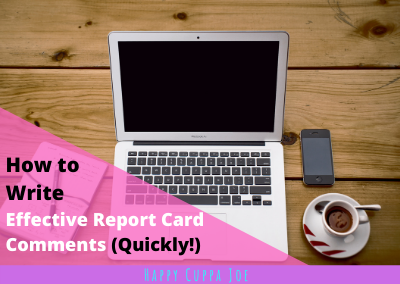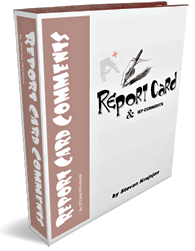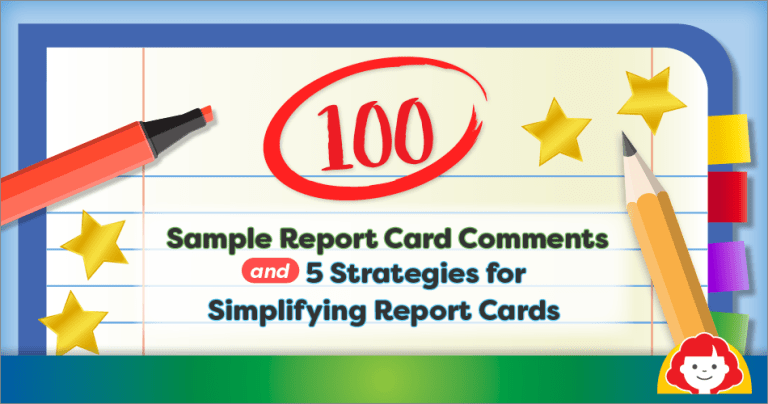Report card season is one of our busiest times of year, but it doesn’t have to be stressful! With the right tips, tools and proper planning, you can easily write quick and effective report card comments without feeling burnt out at the end of the day!
Here are some tips that I’ve learned over the years that will hopefully save you hours of writing this report card season.
I also stumbled onto this extremely valuable resource by Stevan Krajnjan, an experienced teacher from Toronto who has a fantastic blog that is completely devoted to saving our time!
Find his eBook- full of effective report card comments- and many other valuable resources here.
BEFORE WRITING
-
Make sure you’ve connected with parents before report card season!
It’s always a good idea to build positive relationships with your parent community, but this becomes even more valuable now that you’re writing a report card on their child. You don’t want the first conversation with a parent to be a difficult one, so make sure you reach out with a positive about their son or daughter sometime in September or early October first!
For more tips on Setting the Stage for Success in September,

Check out this blog post as well!
-
Plan your units with the end in mind!
This is good practice regardless, but you’ll really notice the benefits when it comes time for report cards. Especially with our first round of report cards, time can easily slip away from you if you don’t pay attention. Make sure you build all strands that you want/need to report on into your September and October units ahead of time.
-
Teach your students metacognition skills.
This is one of my favorite things to teach my students and it’s super easy to fit in around report card time. (I try to keep it light and fun so I don’t stress the class out!) Simply put- metacognition is just teaching your students to understand their thinking. What do they already know, what do they still need to know, and how can they learn it?
Once your students understand this, it makes talking about goals and outcomes more relevant throughout every unit you teach. At the beginning of units, put your essential questions somewhere that everyone can see. This way students can monitor their own understanding throughout units and help keep themselves on track with the right goals!
We do this with “I Can…” statements as much as we can.
Don’t forget to set learning behavior goals as well!
These can include personal management skills, social responsibility goals, and other skills that apply throughout all subject areas. For example:
I can use my class time effectively to complete my assignments.
or
I can participate and ask questions to further my understanding during class discussions.
I put these right on my Daily Slides as a quick and easy reminder for my students to always be trying their best in class!
-
Use assessments effectively and report appropriately.
Remember that your formative assessments should be the ones along the way that help guide your teaching and assess your students’ current understanding. In general, these don’t make it into my Gradebooks. They’re used for my students to form new goals, or for myself to know when to adjust my teaching techniques.
Your summative assessments are the ones that you use to evaluate your students’ understanding at the end of the unit. Remember that these don’t always have to be in the form of a written test! (Although I do see a lot of value in having written tests as well, especially in Grade 4! Teaching “test-taking skills” can be a lot of fun and is something that I worry might get overlooked too easily sometimes!)

https://www.prodigygame.com/main-en/blog/summative-assessment/
Also, try to plan your grading scores with your teaching partner if you’re able to. It’s nice to have someone to work through exemplars with, and it also ensures that students achievement indicators will be consistent across your grade level.
-
Remember that report cards are a snapshot of where your students are currently at.
This was a good lesson from a great teaching friend a few years ago. She told me to stop panicking that I hadn’t taught enough about all of the writing strands to properly report on them, and to remember that I was just reporting on where the student was currently at.
Alright, so you’ve done all that you can with assessments and teaching… now onto the report card writing!
I personally prefer to set aside 3-4 nights and/or 1-2 full weekend days to writing. (This is assuming that these nights are for writing only, marking is done beforehand!) Some people prefer to work one subject at a time- finish all marking and then write. This is clearly up to you!
One thing I will suggest is to set aside your prep times or any other times attached to the school day for marking or proof-reading only.
I find that I waste far too much time trying to get into the groove of writing in a short 30-minute prep. This becomes especially true if you consider all of the interruptions that we face in a day. Not to mention the fact that we still have to keep up with regular teaching days during report card season.
To me, it makes way more sense to grab some of my favorite drinks and snacks and set aside some quiet time outside of school. This is my best shot at focusing all of my energy on writing effective report card comments quickly!
Here are some more tips to writing quick and effective report card comments!
-
Don’t recreate the wheel!
You’ve no doubt heard this saying by now, and it applies to report card writing too! Take your comments directly from outcomes of the curriculum that you’re teaching. Just be sure to change it to parent and student friendly language as you go.
For example, here’s an outcome from the Grade 4 Habitats and Communities cluster of the Manitoba Science Curriculum:
“Students will recognize that each plant and animal depends on a specific habitat to meet its needs”.
So my report card comment might be:
“_________ is able to recognize that plants and animals depend on specific habitats to meet their needs. _______ showed his/her understanding of this with his/her final Habitats Diorama Project.”
-
Use a comment bank. (But go easy on the cut and paste!)
I know this may sound confusing, but hear me out!
I use a comment bank so that I can create solid comments that I can feel proud of within each of the subject areas. You’ll also find that by the time you’re finished commenting on a subject, you feel like you’ve just said the same thing about 23 times.
Comment banks help to ensure that my comments don’t become stale, that they stay student-centered. and that they’re written in student/parent friendly language. Banks also allow me to create a variety of quick and effective report card comments before writing fatigue sets in and I can’t think straight!
Coming up with comments is much easier if you can have a list of language suggestions or qualifiers handy. This is by far my favorite document to use. It includes useful phrases and descriptors that are categorized into strengths, needs, and suggestions!
Writing-Effective-Report-Card-Comments
That being said, don’t let yourself go overboard with copy and paste and forget that you need to be commenting on each individual student’s unique strengths and challenges.
Personally, I will only copy and paste a single sentence for about 4 or 5 students and then I make sure to switch it up.
*Using comment banks is only my first step to effective report card comments. I also go back in once I’m finished and make sure to customize each student as best I can.
Here are a few resources to help get your bank started:
Or if you want to skip all of the trouble- get this 180-page e-Book with over 1,800 comments that are already ready to go! Click here for sample pages, a table of contents, or to get the full resource!
-
Be honest and professional.
Reporting can be tough, especially if you’re like me and you would rather shield your students from any and all pain in their little lives! However, if you teach your students the power of a growth mindset from Day 1, they will hopefully look at their areas for improvement as a new challenge. They should also (hopefully) have an idea of where they’re at anyways if you’ve worked on metacognition skills with them.
Either way, our jobs are to give parents and students honest and professional feedback regarding their learning. So as tough as it may be, make sure that you’re not just telling them what they want to hear!
-
Be constructive and positive.
While you must make sure that you’re being honest with your students about their growth, but this doesn’t mean that you can’t structure your comments to reflect the positives as well!
Not all divisions or districts will be the exact same, but ours follows something like this:
1. Begin with a positive comment or student strengths. What is the student already doing well?
2. Use growth mindset vocabulary to point out one or two things that the student has been working on, but hasn’t quite mastered yet but is working on.
3. Choose the most important outcome or outcomes that you think the student should work on next. Include how you will help the student achieve that goal or outcome.
4. Depending on how your school division or district organizes report card comments, end with words of encouragement. (Or leave this for the learning behaviors section).
Conclusion:
Writing effective report card comments starts long before report card season hits!
Make sure that you’re always planning with the end in mind and that you’re using formative and summative assessments properly. When reporting season hits, set aside enough time outside of school hours to create honest and constructive feedback for your students.
Comment banks can be a huge asset and save you TONS of time! Just make sure to edit your comments so that they’re student specific and written in parent and student-friendly language.
This is the most thorough report card writing resource that I’ve found so far:
Last, but certainly not least, remember that we’re writing these comments about some very important little people! I love having this poster up behind my desk to remind me to be honest, constructive, and kind throughout the report card writing process.

Happy writing!
Micki Banks
Latest posts by Micki Banks (see all)
- Masters Portfolio - October 15, 2024
- Graduate Summative - October 15, 2024
- Expressive Therapies - October 15, 2024




